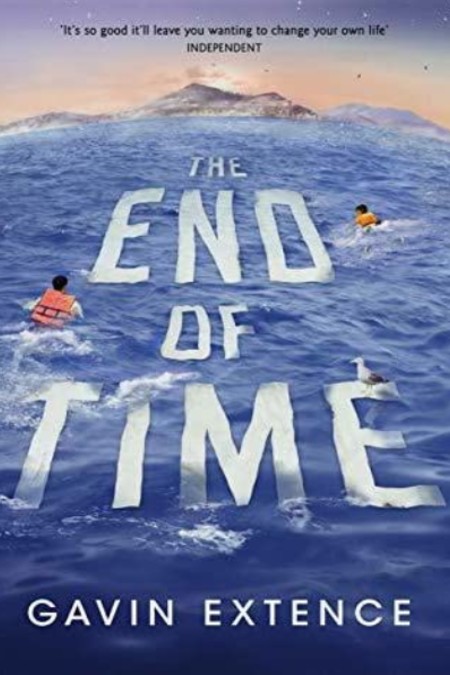If there is one thing that has become clear in the last couple of decades, it’s that people, never very good it must said at the best of times at looking beyond their own self interest, have developed an empathy deficit of frighteningly gaping proportions.
In a world where war, famine, economic deprivation and authoritarian terror are as lamentably common as ever, causing people to flee for their lives in the face of implacable challenges, and where empathy is needed more than ever, people have shown a harrowing disregard for the very real plight of others.
While are they by no means panacea for the selfish ills that afflict the modern human soul, books like The Beekeeper of Aleppo by Christy Lefteri and the subject of this review, The End of Time by Gavin Extence, do play a role in helping people to understand the grave dangers that refugees from around the world face and to hopefully a greater appreciation of their plight.
This is vitally important with an unsettling worldwide trend to xenophobia and the horrifying propensity of many nationalist leaders to thump the tub of the bogeyman immigrant in the hope of attracting greater support.
Sadly, the very thing that elevates voter support for a leader’s anti-immigrant position also makes life for very real people fleeing terrible threats all the more difficult, something that becomes painfully clear throughout The End of Time which details the flight of two brothers from Latakia in Syria, 19-year-old thoughtful, ethical uni student Zain and rambunctious, soccer-loving, swearing prone 14-year-old Mohammed from their war-torn homeland to the hoped-for sanctuary of the United Kingdom.
“I had been on one of those terrible boats, as you know, so I could well imagine the utter hell of sharing that cramped space with a belligerent drunk. I could appreciate the danger such a person would pose. I could picture, clear as crystal, Sabeen and the other mothers trying to shield their frightened children from the developing spectacle. And yet – despite all these things – I still felt sorry for Jesus. he may have been an awful travelling companion, but he was also the man who had held me up when I was too weak to stand, who led me and my brother to food and water. I didn’t like to see him as he was now, alone and maligned, and I suppose this is why I reacted as I did.” (P. 39)
While not possessed of a particularly unique depiction of the horrors that many refugees face getting from their home country to the safety and opportunity of the West, The End of Time excels by zeroing in on the heart of this divisive issue by showing what it can be like for someone to be so desperate for a life free from terror, violence and ongoing grievous loss, that they will place themselves in the hands of people smugglers, unscrupulous law enforcement officials, the fluctuating policies of many governments and the uncertain goodness of people along the way.
Extence is quick to point out that what people like Zain and Mohammed experience can be filled with as much possibility and hope as it can be disappointment and hurtful deprivation, and there are many examples of the kindness of strangers depicted throughout this novel, but he is also honest about the fact that a journey of this kind is more likely to lead more loss rather than less.
There are, as you might expect, more than a few harrowing moments.
The first among them is the fact that the two brothers have to swim from Turkey to Greece at night, all their limited worldly belongings secreted inside waterproof bags, hope in their hearts but a grim understanding that ahead lays literal darkness, a host of obstacles but also the possibility of a life free from the violence and recriminations of the Syrian civil war which has already likely claimed their parents.
There is a lot resting on one three kilometre, and on the shoulders of Zain, who has been charged by his mother with getting the two boys to the safety of the UK where, armed with a fluent grasp of English, she hopes they will have the sort of life that their broken home country can no longer offer.
Amidst all this grimness, however, there are some truly lovely moments.
Chief among them is the fact that they are rescued, bedraggled and exhaustion on the Greek island beach they reach by an older alcoholic Iraqi man who calls himself Jesus the Messiah.
He believes he was fated to rescue the two boys, and while neither Zain nor Mohammed embrace his divine certainty of the inevitability of their meeting – Zain is an avowed apostate Muslim while Mohammed is more dedicated to football, his hero Messi and his club FC Barcelona – they soon form an unbreakable bond with the man who it turns out needs them every bit as much he claims they need him.
The joy of The End of Time, and there is a considerable amount of it despite the abundant proof of humanity’s tendency to brutality, exploitation of those less fortunate than them for personal gain and damaging ambivalence, is that these three people become a found family of sorts, helping each other get to safety in the face of obstacles both deliberate and inadvertent, demonstrating as they do so that even in the very worst of circumstances, goodness, and yes empathy can prevail.
“I saw again the mountains of Samos under the blazing Greek sun. I saw Effie, the bargirl who’d stopped to help us when Jesus collapse in the road. I saw all the people who’d helped us: the policeman in Samos Town, whose name I’d never discovered, Dr Polgár, the Hungarian neurologist; all the volunteers and charity workers who’d distributed food in shelters and at train stations.
I saw Firas, smiling in his US Air Force hoodie.
I saw my parents, and they gave me the strength to carry on.” (P. 306)
It should be noted here, of course, that Extence does not for a second romanticise one bit of Zain and Mohammed’s soul-sapping, physically demanding journey through Europe to what they hope will be eventual asylum in the UK.
Not does he stint on the fact that there is the yawning empathy deficit is very real and cruel in its dismissal of the all-too-real suffering of others.
But in the middle of all this confronting honesty, The End of Time remains focused on the humanity of the narrative, that the refugees fleeing to a better life, rarely because of any reason than because they have no other real choice but to do this, are people like you and me who simply want their loved ones to be safe, who want a future and who want to feel like life has meaning and purpose.
Extence’s evocation of this universality of human experience is not heavyhanded or overdone; rather, by expressing it through the arrestingly evocative story of Zain and Mohammed, he beautifully conveys what it is like to run for your life and how much sorrow and heartbreak there is mixed with desperate hope.
It is true that we need more empathy as a people, and in the supernaturally-tinged wonder and raw honesty and heartwarming truthfulness about the good in people that is The End of Time, we find a story that might just play a part in helping those people with open hearts and listening ears to appreciate that far from being the ogres of far right populist rhetoric that people like Zain and Mohammed simply want what we all want, and that, if we can give it to them, we do everything in our power to make it happen.

